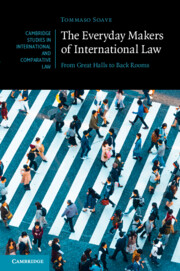Book contents
- The Everyday Makers of International Law
- Cambridge Studies in International and Comparative Law: 170
- The Everyday Makers of International Law
- Copyright page
- Dedication
- Epigraph
- Contents
- Preface
- Abbreviations
- 1 Carnegieplein 2, 10:00 am
- 2 Coffee, Cigarettes, and International Judicial Practices
- 3 A New Generation of Litigators
- 4 Telling a Story
- 5 The Invisible Army
- 6 The Three Wise Monkeys
- 7 The Lyophilization of Life
- 8 The Memo
- 9 To Capture the World
- 10 Bricolage
- 11 The Explorer
- 12 A Four-Letter Word
- 13 What Does It Mean…
- 14 The Stage
- 15 The Moment of (Constructed) Truth
- 16 Truth Woven Together
- 17 Spijkermakersstraat 9, 8:00 pm
- Index
- Cambridge Studies in International and Comparative Law
5 - The Invisible Army
Published online by Cambridge University Press: 03 November 2022
- The Everyday Makers of International Law
- Cambridge Studies in International and Comparative Law: 170
- The Everyday Makers of International Law
- Copyright page
- Dedication
- Epigraph
- Contents
- Preface
- Abbreviations
- 1 Carnegieplein 2, 10:00 am
- 2 Coffee, Cigarettes, and International Judicial Practices
- 3 A New Generation of Litigators
- 4 Telling a Story
- 5 The Invisible Army
- 6 The Three Wise Monkeys
- 7 The Lyophilization of Life
- 8 The Memo
- 9 To Capture the World
- 10 Bricolage
- 11 The Explorer
- 12 A Four-Letter Word
- 13 What Does It Mean…
- 14 The Stage
- 15 The Moment of (Constructed) Truth
- 16 Truth Woven Together
- 17 Spijkermakersstraat 9, 8:00 pm
- Index
- Cambridge Studies in International and Comparative Law
Summary
This chapter starts to analyse the institutional frameworks of different international courts and tribunals in comparative perspective. More importantly, it introduces the invisible army of legal bureaucrats (clerks, registry and secretariat officials, and arbitral secretaries) who assist international adjudicators in their daily duties. The story focuses on their backgrounds, their modes of recruitment and promotion, their relationship with the judges and arbitrators they are called to serve, and the ambiguities inherent in that relationship. From here onwards, the role of bureaucrats in the judicial process will come into sharper relief. Their duties typically include: summarizing the parties’ arguments for the benefit of the adjudicators, conducting legal and factual research on the disputed issues, circulating internal memoranda that suggest options on how to solve the case, assisting in the preparation of oral questions for hearings, attending deliberations, and drafting the final judgments or awards.
Keywords
- Type
- Chapter
- Information
- The Everyday Makers of International LawFrom Great Halls to Back Rooms, pp. 102 - 136Publisher: Cambridge University PressPrint publication year: 2022

